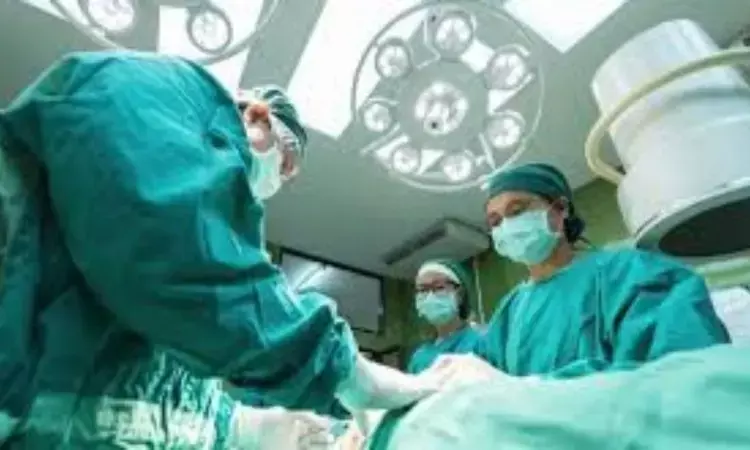- Home
- Medical news & Guidelines
- Anesthesiology
- Cardiology and CTVS
- Critical Care
- Dentistry
- Dermatology
- Diabetes and Endocrinology
- ENT
- Gastroenterology
- Medicine
- Nephrology
- Neurology
- Obstretics-Gynaecology
- Oncology
- Ophthalmology
- Orthopaedics
- Pediatrics-Neonatology
- Psychiatry
- Pulmonology
- Radiology
- Surgery
- Urology
- Laboratory Medicine
- Diet
- Nursing
- Paramedical
- Physiotherapy
- Health news
- Fact Check
- Bone Health Fact Check
- Brain Health Fact Check
- Cancer Related Fact Check
- Child Care Fact Check
- Dental and oral health fact check
- Diabetes and metabolic health fact check
- Diet and Nutrition Fact Check
- Eye and ENT Care Fact Check
- Fitness fact check
- Gut health fact check
- Heart health fact check
- Kidney health fact check
- Medical education fact check
- Men's health fact check
- Respiratory fact check
- Skin and hair care fact check
- Vaccine and Immunization fact check
- Women's health fact check
- AYUSH
- State News
- Andaman and Nicobar Islands
- Andhra Pradesh
- Arunachal Pradesh
- Assam
- Bihar
- Chandigarh
- Chattisgarh
- Dadra and Nagar Haveli
- Daman and Diu
- Delhi
- Goa
- Gujarat
- Haryana
- Himachal Pradesh
- Jammu & Kashmir
- Jharkhand
- Karnataka
- Kerala
- Ladakh
- Lakshadweep
- Madhya Pradesh
- Maharashtra
- Manipur
- Meghalaya
- Mizoram
- Nagaland
- Odisha
- Puducherry
- Punjab
- Rajasthan
- Sikkim
- Tamil Nadu
- Telangana
- Tripura
- Uttar Pradesh
- Uttrakhand
- West Bengal
- Medical Education
- Industry
COVID-19 diagnosis after joint replacement tied to increased risk of complications, death: Study

USA: A recent study showed that about 34% of patients diagnosed with COVID-19 following total joint arthroplasty (TJA) required COVID-19-driven readmission.
The study, published in The Journal of Arthroplasty, pointed out an increased risk of serious complications, including pulmonary embolism, sepsis, and death in patients who contracted COVID-19 following total joint arthroplasty.
Patients who contracted COVID-19 following elective TJA were nearly 39 times more likely to die than matched controls.
The researchers notes that the patients who get COVID-19 following total joint arthroplasty represent a unique, high-risk cohort that may need more aggressive medical interventions. Therefore, they suggest that orthopaedic surgeons should actively promote safe COVID-19 practices such as mask-wearing, vaccination counselling, and social distancing to avoid severe complications.
COVID-19 is a respiratory disease capable of causing severe, life-threatening complications, including renal failure, cardiovascular disease, thromboembolic events, and neurologic disorders. Given the potential for COVID-19 to cause multiorgan failure, respiratory failure, and death, patients who undergo total joint replacement may be at elevated risk of postoperative complications. Despite this, only a few studies have documented the effects of COVID-19 contraction following elective primary TJA.
To fill this knowledge gap, Nathanael D. Heckmann, Keck Medical Center of USC, Los Angeles, CA, and colleagues aimed to analyze complication rates after elective primary TJA in patients who contracted COVID-19 in the postoperative period. They also sought to identify patient and hospital factors associated with unplanned readmission due to COVID-19 infection following TJA.
For this purpose, the researchers queried an extensive national database of adult patients who underwent primary elective total joint arthroplasty in 2020. Patients who contracted COVID-19 after total hip (THA) or knee arthroplasty (TKA) underwent 1:6 matching (sex, age, COVID-19-related comorbidities, month of surgery) to patients who did not. Differences between groups were evaluated. Overall, 712 COVID-19 patients were matched to 4,272 controls.
The study revealed the following findings:
- Of patients diagnosed < 90 days postoperatively, 32.5 to 33.6% required COVID-19-driven readmission.
- Discharge to a skilled nursing facility (adjusted odds ratio [aOR] 1.72) or acute rehabilitation unit (aOR 4.93) and Black race (aOR 2.28) were tied to readmission after TKA.
- Similar results were associated with total hip arthroplasty. COVID-19 patients were at an elevated risk of pulmonary embolism (aOR 4.09) after TKA and also periprosthetic joint infection (aOR 4.65) and sepsis (aOR 11.11) after THA.
- In COVID-19 patients, the mortality rate was 3.51% and 7.94% in readmitted COVID-19 patients versus 0.09% in controls, representing 38.7 OR and 91.8 OR of death, respectively. Similar results were seen separately for TKA and THA.
In a commentary on the study and its findings, Dr.(Prof.) Raju Vaishya, Senior Joint Replacement Surgeon, Indraprastha Apollo Hospitals, New Delhi told Medical Dialogues, "Deep vein thrombosis and pulmonary embolism are common in COVID-19-positive patients because COVID-19 is associated with coagulopathy and hypercoagulable state, which is secondary to an imbalance between coagulation and inflammation."
"The imbalance arises from immune system activation leading to endothelial injury, loss of antithrombotic mechanisms, excess thrombin production, and poor fibrinolysis and thrombosis," he elaborated
"Our data suggest that total joint arthroplasty may be safely performed, given the low prevalence of COVID-19 infection," the study authors conclude. "However, for the small subset of patients who contract COVID-19, there is an increased risk of serious complications, including mortality, pulmonary embolism, and periprosthetic joint infection."
Reference:
Heckmann ND, Wang JC, Piple AS, Bouz GJ, Chung BC, Oakes DA, Christ AB, Lieberman JR, Positive COVID-19 Diagnosis Following Primary Elective Total Joint Arthroplasty: Increased Complication and Mortality Rates, The Journal of Arthroplasty (2023), doi: https://doi.org/10.1016/j.arth.2023.04.052.
Dr Kamal Kant Kohli-MBBS, DTCD- a chest specialist with more than 30 years of practice and a flair for writing clinical articles, Dr Kamal Kant Kohli joined Medical Dialogues as a Chief Editor of Medical News. Besides writing articles, as an editor, he proofreads and verifies all the medical content published on Medical Dialogues including those coming from journals, studies,medical conferences,guidelines etc. Email: drkohli@medicaldialogues.in. Contact no. 011-43720751


